MusiQ
Jali Musa Jawara - Direct From West Africa
Table of Contents
Download
Filename: jali-musa-jawara-direct-from-west-africa.rar- MP3 size: 12.4 mb
- FLAC size: 180.8 mb
Tracks
| Track | Duration | Preview |
|---|---|---|
| Yekeke | 7:46 | |
| Haidara | 10:52 | |
| Fote Mogoban | 6:32 | |
| Yasimika | 8:04 |
Video
Jali Musa Jawara - Yekeke
Djeli Moussa Diawara - Yekeke (Paris 2010) - Full Album
Fote Mogoban - Jali Musa Jawara
Images
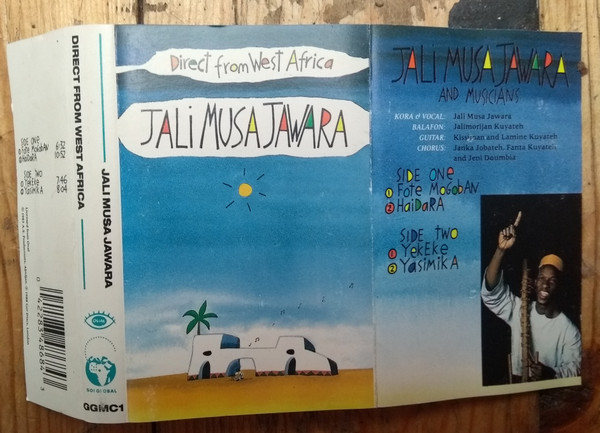
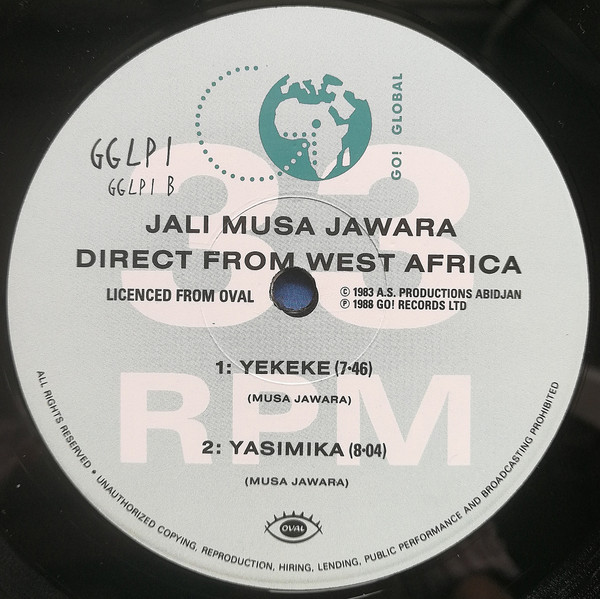
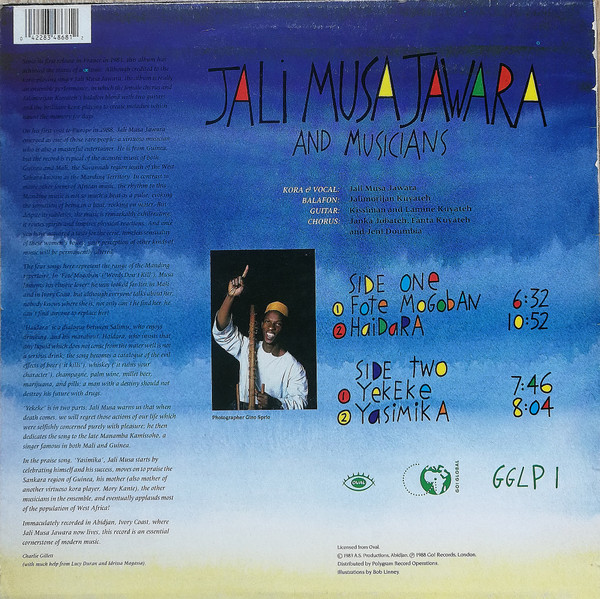
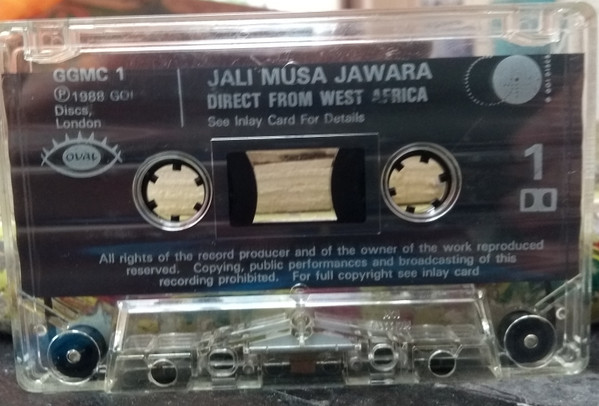
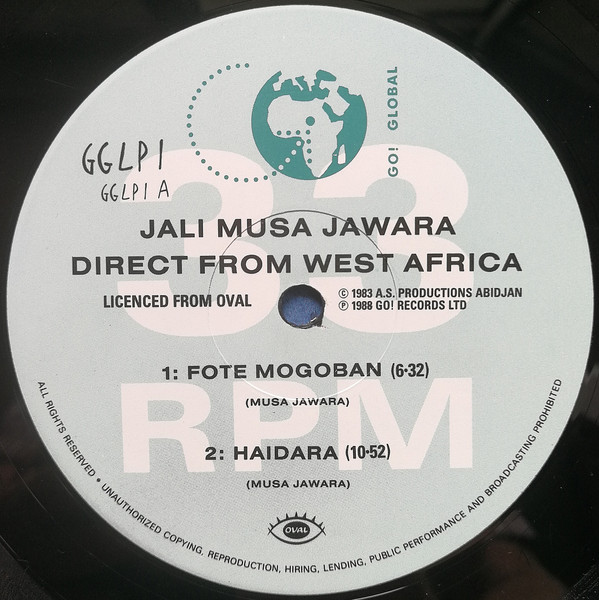
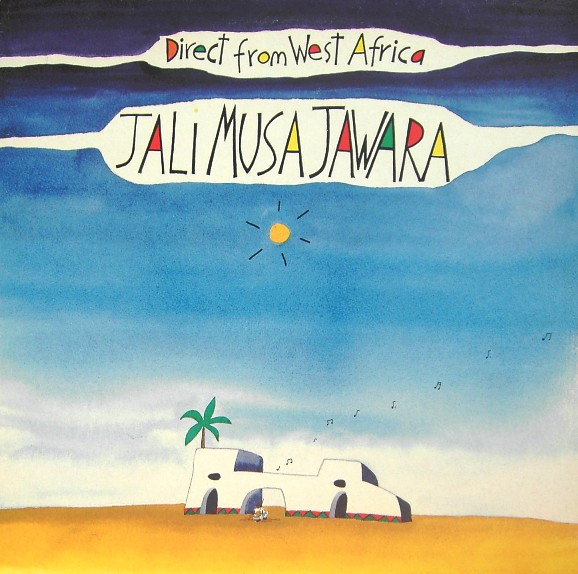
Catalog Numbers
- GGLP1
- GGMC1
Labels
Go! GlobalListen online
- kuunnella verkossa
- lytte på nettet
- ouvir online
- écouter en ligne
- ascolta in linea
- escuchar en línea
- online luisteren
- online anhören
- lyssna på nätet
Formats
- Vinyl
- LP
- Album
- Reissue
- Cassette
Companies
| Role | Company |
|---|---|
| Record Company | Go! Records |
| Licensed From | Oval |
| Phonographic Copyright (p) | Go! Records Ltd. |
| Copyright (c) | A.S. Productions, Abidjan |
| Distributed By | Polygram Record Operations Ltd. |
Credits
| Role | Credit |
|---|---|
| Artwork By | Bob Linney |
| Chorus | Janka Jobateh, Jeni Doumbia, Fanta Kuyateh |
| Guitar | Kissiman, Lamine Kuyateh |
| Kora | Jali Musa Jawara |
| Vocals | Jali Musa Jawara |
| Liner Notes | Charlie Gillett |
| Marimba | Jalimorijan Kuyateh |
| Photography | Gino Sprio |
| Written-By | Musa Jawara |
Notes
- © 1983 A.S. Productions, Abidjan.
- ⓟ 1988 Go! Records, London.
- Distributed by Polygram Records Operations
Barcodes
- Barcode: 0 42283 48681 2
- Matrix / Runout (Side A, etched): OVLP 511 A
- Matrix / Runout (Side B, etched): OVLP 511 B1
- Barcode: 0 42283 48684 3
About Jali Musa Jawara
Djeli Moussa Diawara (also known as Jali Musa Jawara) is born in a family of griots. His father was a balafon player, and his mother a singer. His half-brother, they share the same mother, is Mory Kanté. He then became a « jali » or « djeli », a mandingo word for griot. He learned to play the balafon, the kora and the guitar.
At 18, he went to Abidjan, Côte d'Ivoire where he played with his half-brother who was leading the legendary Rail Band. Starting his solo career, he worked with Djenne Doumbia, a great singer who later joined Salif Keita's group.
In 1983, he recorded his first LP, "Yasimika" which was considered to be a great piece of African music. Then, he left for Paris.
He released his "Flamenkora" album in 1998, offering a rich blend of styles, from his Mandingo roots to Flamenco.
In 2000, Djeli Moussa recorded "Ocean Blues - from Africa to Hawaiï" with Bob Brozman, which received rave reviews.
He then founded Kora Jazz Trio, with Abdoulaye Diabaté (piano) and Moussa Cissoko (drums). He composed most of the tracks on which he sings. He also played the Kora and sometimes the guitar, on the three albums they released (Part I, II & III).
Singer and musician, Djeli Moussa developed a very intimate relationship with his 32-stringed Kora, which is unique and was adapted at his request from the 21-stringed traditional Kora. He was able to adapt to many different rhythms from traditional Mandingo to Salsa, Flamenco, Blues and Jazz.
He has worked with many internationally acclaimed artists like Ali Farka Touré, Carlos Santana, Manu Dibango, Janice deRosa, Stephan Eicher and Cheick Tidiane Seck.
Name Vars
- Cissoko
- Diawara
- Diely Moussa Diawara
- Djeli Mousa
- Djeli Moussa
- Djelly Moussa Djawara
- Djelmi Moussa Diawara
- Djely Moussa Diawara
- Djéli Moussa Diawara
- Jali Moussa Jawara
- Jali Musa Jawara
- Jawara
- Musa Jarawa
- Musa Jawara


"This, his self titled debut solo record is a remarkable slice of Mande Folk and Belafon, Kora playing Nd is considered an important release for West Africa. The record is made up of four tracks (two per side) that travel along in a methodical rhythm. From start to finish Diawara displays such a high and mature understanding of these complex instruments while celebrating the traditional sounds and stories of his culture. There is a magical joyousness and celebration in these songs that sound like a call and response between Diawara and a chorus of singers that sing high in the background in affirmation." @t
@t